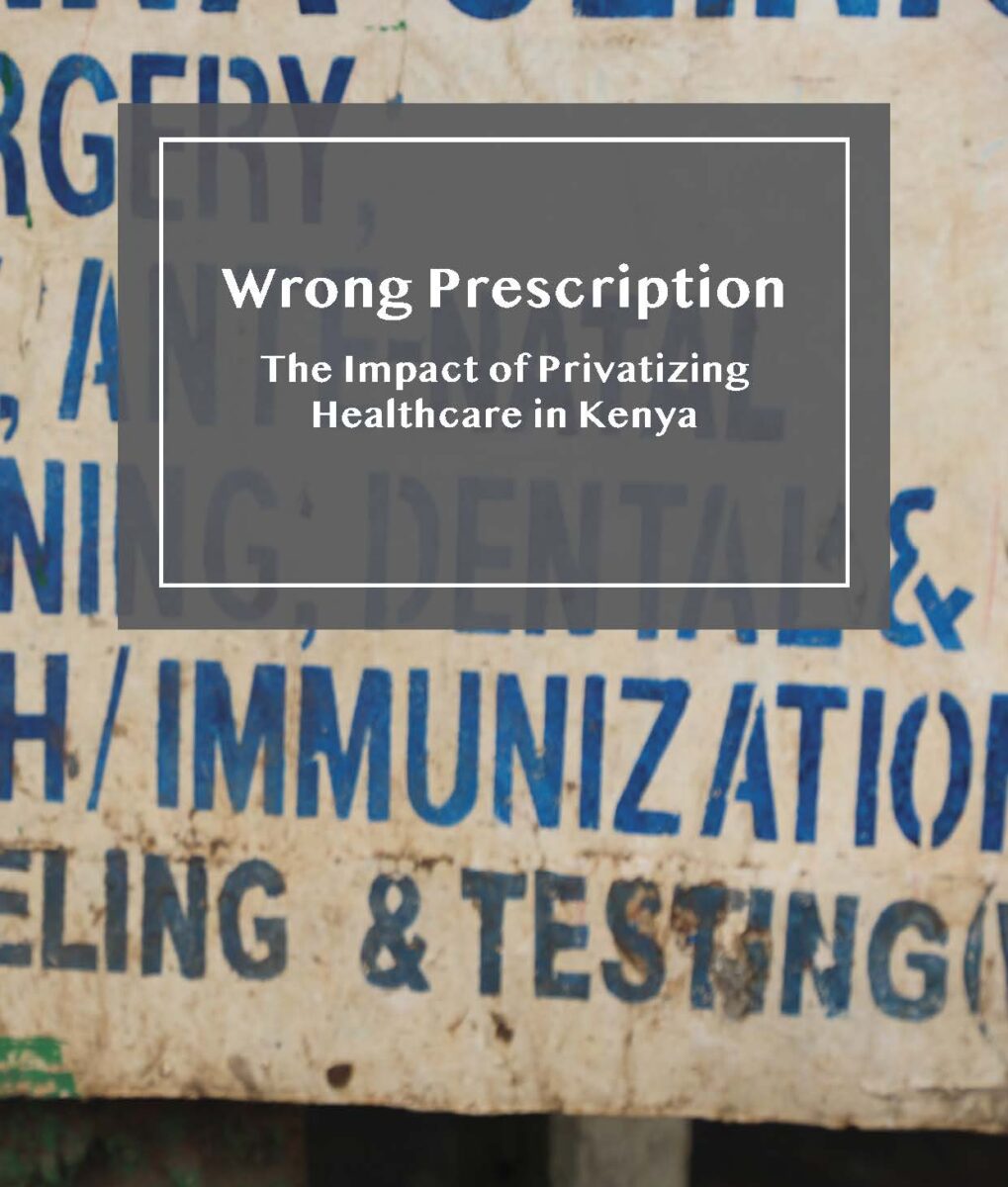The 49-page report, “Wrong Prescription: The Impact of Privatizing Healthcare in Kenya,” is authored by Hakijamii and the Center for Human Rights and Global Justice at New York University. It finds that privatization has proven costly for individuals and the government, has shut people out of access to healthcare, and is undermining the right to health. The government’s signature policy for achieving universal health coverage—the planned expansion of private-sector friendly social insurance through the National Hospital Insurance Fund (NHIF)—risks exacerbating these problems.
“Privatization is the wrong prescription for achieving universal health coverage,” said Philip Alston, former United Nations Special Rapporteur and co-author of the report. “Proponents of private healthcare make all sorts of promises about how it will lower costs and improve access, but our research finds private actors have really failed to deliver.”
“Promoters of private care have gravely misdiagnosed the situation,” said Nicholas Orago, Executive Director of Hakijamii and co-author of the report. “While many associate private care with high-quality facilities, the ‘haves’ and ‘have nots’ experience entirely different private sectors. Private healthcare has been disastrous for poor and vulnerable communities, who are left with low-quality, low-cost providers pedaling services that are too often unsafe or even illegal.”
Privatizing care has proven costly for both individuals and the government. The private health sector relies heavily on government funding, including tens of billions of shillings each year to contract with private facilities, subsidize access to private care, and pay for secretive public-private partnerships. Individuals face excessively high fees at private facilities, where treatment can cost in excess of twelve times more than the public sector.
“Healthcare is a big business, with global corporations and private equity firms lining up to profit off the sector in Kenya,” said Rebecca Riddell, Co-director of the Human Rights and Privatization Project at the Center and co-author of the report. “These companies expect returns on their investments, leading to overwhelmingly higher prices in the private sector while scarce public resources prop up private profits.”
The report draws from more than 180 interviews with healthcare users and providers, government officials, and experts. Researchers spoke with community members from informal settlements in Mombasa and Nairobi as well as rural areas in Isiolo. Many described being excluded from private care or facing hardships to afford treatment, such as selling important assets like land or forgoing educational and livelihood opportunities. Others described tragic consequences of low-quality care at private providers, including unnecessary deaths and disabilities. The impact has been particularly severe for people who are poor or low income, women, people with disabilities, and those in rural areas.
Researchers also found that the private sector in Kenya is concentrated in more profitable forms of care, and has neglected less commercially viable areas, patients, and services. Private sector healthcare workers described having to meet patient “targets” as well as working in conditions significantly inferior to those in the public sector.
“The disconnect between profits and public health goals should cause policymakers to rethink their reliance on the private sector,” said Bassam Khawaja, Co-director of the Human Rights and Privatization Project and report co-author. “Many essential health services are incredibly valuable or even lifesaving but may not be profitable as one-off transactions.”
The anticipated nationwide rollout of mandatory NHIF coverage will divert more public money to private actors without preventing exclusion and high costs. Though the NHIF is a public insurer, it contracts extensively with private facilities, offers private providers higher reimbursement rates, and sends most of its claims money to private actors. “Expanding coverage through the NHIF instead of investing in a strong public health system is a major step backwards,” Orago said.
Much of the pressure to privatize has come from external actors in the global North. Key development actors have urged Kenya to increase the private sector’s role in health, including international financial institutions, private foundations, and wealthy countries looking for new markets.
“An ideological commitment to the private sector has trumped the rights of the Kenyan people, as development actors promote private care and financing without accountability,” Alston said. “The extreme secrecy around many arrangements with the private health sector opens the door to corruption and self-dealing.”
The report concludes that the government should rethink its support for the private sector and prioritize the public healthcare system, which still delivers the majority of inpatient and outpatient care in Kenya despite being starved of resources. “While the government should address serious shortcomings in the public system, popular recent investments illustrate an enduring appetite for public care,” said Alston.
“With sufficient political will and resources, the public healthcare system is best positioned to provide all Kenyans with the accessible, affordable, and quality healthcare that they have a right to,” said Orago.



